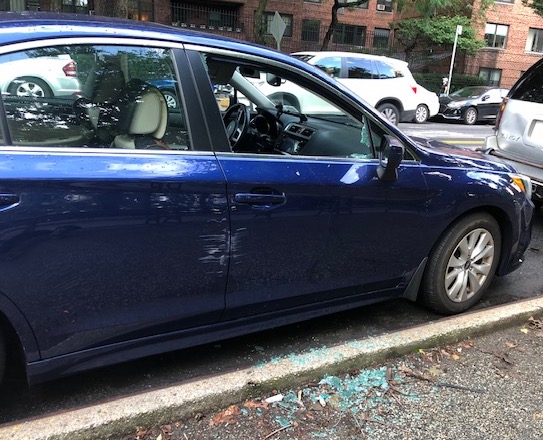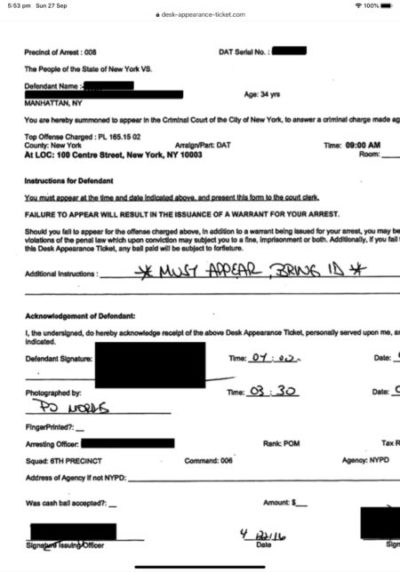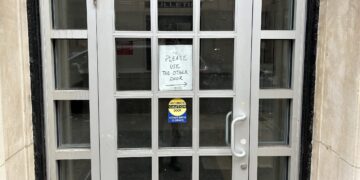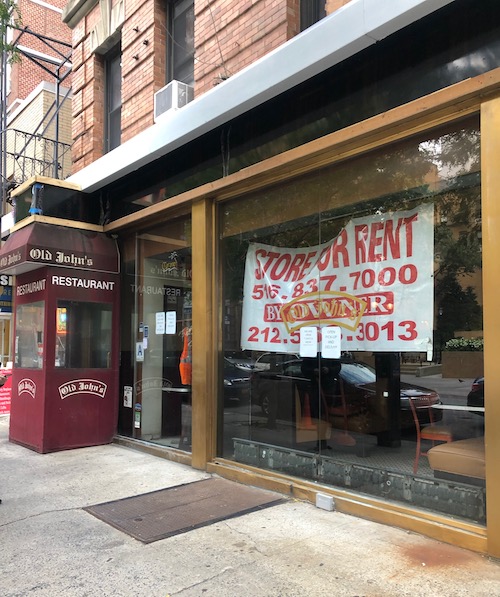
By Carol Tannenhauser
An Upper West Side police commander is pointing to a spate of smash-and-grab car thefts in the neighborhood to criticize the state’s new bail law. The law mandates that people receive “desk appearance tickets” when they are arrested for certain nonviolent crimes instead of being arraigned immediately and potentially sitting in jail to await trial.
Those appearance tickets — essentially orders to report to court — mean that some repeat offenders are more likely to have other chances to commit crimes while awaiting arraignment, argued Deputy Inspector Naoki Yaguchi, commander of the 24th precinct, in a recent interview.
Case in point: On Tuesday, September 22nd, a little before 7 a.m., a 49-year-old man was arrested by NYPD Officer Liam Kite, a 24th Precinct uniformed patrol officer who graduated from the police academy in July.
“It was a good arrest,” said DI Yaguchi, Kite’s commander, “safe, gentle, and effective.”
The man had been found sitting in a Dodge SUV, parked opposite 108 West 107th Street, beside a smashed passenger window. The police were alerted by an eyewitness, a community resident who saw the break-in taking place and called 911. When Officer Kite and his partner arrived, they found in the man’s possession, “a railroad spike, some suspected marijuana, and a crack pipe,” according to a police spokesperson.
As the arrest was being made, a call came in that another car had been broken into about an hour before, two blocks away, in front of 176 West 105th Street. The car’s owner said tools valued at around $900 were taken. “Evidence gathered by the police tied that break-in to the same man,” the NYPD spokesperson said.
The outcome? The man was taken to the station house, processed, issued a “Desk Appearance Ticket” (DAT) with a court date in about 20-30 days, and released. “He’s out within hours,” the NYPD spokesperson said.

Prior to the passage of the 2020 Bail Reform Act, things might have gone differently, DI Yaguchi explained:
Before, based upon a person’s criminal history, we could make a decision and say, ‘This person has been arrested multiple times for the same crime and we’re not going to give him a Desk Appearance Ticket, because he has essentially broken the trust of the public. Now, we are mandated to give DATs for misdemeanors, violations, and Class E felonies, with certain exceptions.
In this case, he had a petit larceny, which is by nature a misdemeanor, and a criminal mischief Class E Felony, with no outstanding warrants. We had to give him a DAT. That means, instead of going straight downtown and seeing a judge within 24 hours that now happens within the next month or so. Meanwhile, he’s back on the street. This guy was also arrested for a car break-in in January and has committed them all the way back to 2018. Now, by law, we had to give him a DAT.
“It’s frustrating,” DI Yaguchi concluded. “Car break-ins have been a constant theme for us and the Upper West Side throughout this entire year. I know this isn’t the case of the century that anyone is paying much attention to, but our obligation is to the residents. Our job is to get the people who are committing these break-ins off the street. Now, we’re required to let them go again.”
The legislative intent of the 2020 Bail Reform Act was stated in Senate Bill S2101A: “To end the use of monetary bail, reduce unnecessary pretrial incarceration and improve equity and fairness in the criminal justice system.”
“The DAT issue falls into the second category, and has been blown out of proportion,” said Don Murray, a criminal defense attorney in NYC for 30 years. “What it does is delay the arraignment, which is the first time the defendant sees a judge. It doesn’t make the case go away. Yes, the law is structured now so that DATs in certain cases are mandatory, so scenarios like this one come up. But, ultimately, the law always catches up with them.”
Murray said chronic repeat offenders like the man above are exceptions, and highly publicized cases like his “overshadow the greater circumstance that is being more manageably and equitably controlled by the reforms.”
Bail reform proponents have pointed to cases like that of Kalief Browder, a 16-year-old who was arrested on a robbery charge for allegedly stealing a backpack. He was held on $3,000 bail for 74 days before being indicted. The prosecutors eventually dropped the charges, but Browder — who had experienced severe trauma in jail — later killed himself.
“If you look at the vast numbers of cases that come through as DATs, they’re not like this,” Murray contended. “The majority of cases in which these DATs are given out involve people who have never been charged with anything before in their lives. The crimes are low level. Getting a DAT saves them 24 hours in the system, 24 hours of being held in a cage, which is 24 hours more time than they’ll ever do for these low-level offenses. The problem was, when DATs were not mandatory, there may have been some disparity in how they were given out. It was at the discretion of the police. That was taken away from them, and that evens the playing field a little.”
Alfred Baker, director of media relations, NYPD, disagrees vehemently about the mandatory DATs. “A major element that emerges is that the crime comes with little in the form of deterrence,” he wrote to WSR. “This defendant was back on the street within hours. So, there is no meaningful consequence for victims or the accused. And there is certainty about there being no consequence. So there is very little motivating people to think twice about committing acts like these that truly victimize people and tear at the fabric of life in this community.”








There should be some upper limit to how many DAT’s one can accumulate before being locked up on the next DAT-able offense. I mean if you get enough parking tickets your car gets booted and or towed. I don’t see why the same rule can’t be applied to issuing DATs.
this acceptable account spells out the case for the police.
i would like to hear from another thinker—someone who sees the big picture, an ‘RBG type reader’—to respond with the argument for the other side.
surely this new tactic was introduced because the old ways weren’t working out for everyone involved.
It’s really not that complicated.
If the car-window-smasher were arrested and had bail set, he could STILL WALK FREE IF HE PAID BAIL. Whether or not he could pay bail has NOTHING to do with whether he will reoffend.
In other words, under a bail system, guilty rich people remain free to reoffend, whereas innocent poor people (who are disproportionately people of color) remain in indefinite detention without their guilt being proved, often losing their jobs or unable to take care of their families.
Under a bail system, Jeffrey Epstein walks free. Kalief Browder sits on Rikers for two-plus years.
Indefinite detention just because a cop says you committed a crime–unless you can buy your way out of it–is not fit for a free society.
What happened to Kalief Browder was truly terrible, but this bail reform law has been an absolute disaster. To what depths is this city going to sink before city hall takes this seriously.
Whoever comes to office after DiBlasio is just going to continue his policies. We can hope to see change starting in 2025 if we are lucky (and I don’t expect it).
Bail reform is a NY State policy.
Bail reform was passed by NY state senate and assembly, enacted by Cuomo, not de Blasio. Keep that in mind this November when state representatives are up for re-election.
The argument for DATs: innocent until proven guilty.
Would you like to be jailed without the ability to see a judge because someone decided you had committed a crime?
Most of the people who support “broken windows” really mean “lock those other people up”. But, if they were put in jail for being suspected of drinking wine in Central Park, doing “club drugs”, or possible drunk driving, they’d have a pretty different take.
I think there is a really easy solution to this problem. DATs are OK for first time offenders for minor crimes (not sure how one defines minor). Those with multiple offenses of any kind, even if they were only very minor, move beyond this and are not let back on the streets. It’s not really complicated.
Like your thinking!
I think both sides of the argument have merit. One thing not mentioned is that you are considered innocent until proven guilty so why should someone have to stay in jail for a minor offense if they don’t have priors? An additional factor I’d like examined is the “cost/benefit ratio”. Do DAT people commit the same crimes before appearing? Do DAT people commit different crimes? Is there a correlation? Also importantly how many show up? What is the cost of finding people who don’t show up vs incarceration and/or bail? Right now what you are reading a singular anecdotal one-offs. Yes, they are real and quite material to people who have been robbed (yes, I have multiple times so I can speak from experience). Still you want to make decisions based on the macro data not anecdotal.
Kudos! Good, reasoning.
This is what NYC deserves. After voting in the useless mayor in not once, but twice that actually deserve this. I’ve lived in NYC almost 15 years (which is nothing compared to a lot of people) but paying market rents (unlike a lot of you) to raise a family here is starting to really look nuts. The worst part of this is after De Blasio/Cuomo are gone, it will be another nut-job on the blue ticket selling the same snake oil.
This is not such a trivial crime, as some people suggest. Aside from having stuff stolen from them, owners will have to spend time cleaning out the broken glass from inside and spending hours (and money) getting the broken window replaced. In exchange for the privilege of going free without paying bail, “suspects” should have an electronic ankle device attached to ensure that they will turn up for a court appearance.
If the cops, get out of their damn cars, & walk a beat! The City would be much Safer! They only drive to “special requests”, through 911. Show up after the fact to take notes, file reports, and watch videos. Then back to the Donut Shops! Need Cops on the corners! Not Cameras! One Cop per 5 Blocks! Not more than one. Then hang out, looking at their phones, & young women.
No More Stop, & Frisk! No more Quotas! No Task Forces! No waste of Anti Terrorist Funds! Simple one cop per 5 blocks! Then maybe could actually stop a crime, murder, rape, stabbing, shooting in progress!
Don’t know why people are bring up “innocent until proven guilty”, which of course is always the case. But the guilty verdict is not rendered by the police but rather the judge so it has nothing to do with DATs or getting jailed. After all they are what happens *before* you appear in front of a judge. They arrest one on suspicion of a crime, which one may or may not get charged with, which again may or may not be convicted. We are love the notion of “innocent before proven guilty” but this is not the scenario in which it even remotely applies.